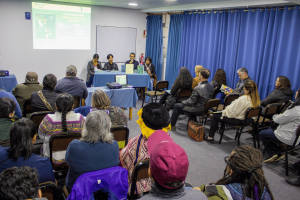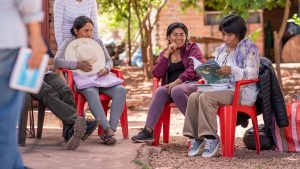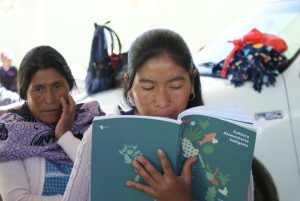The city of Cusco was the setting for the launch of "Indigenous Food Culture: Territory, Tradition and Transformation of Food...
Rimisp presents results of study on outstanding experiences of agroecological transition in Latin America
During the webinar “Learnings from outstanding experiences of agroecological transition in Latin America”, Rimisp senior researcher Rafael Lindemann presented the main findings of the systematisation of ten initiatives from eight countries in the region.
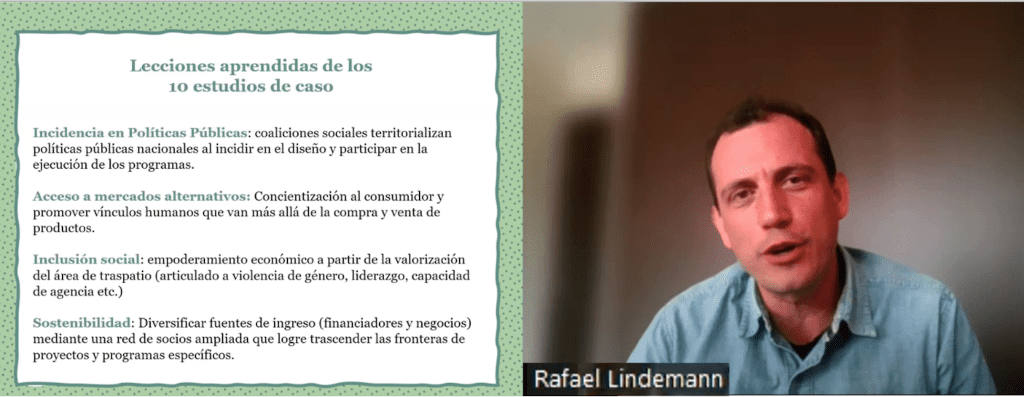
The project “Lessons from Latin America on Agroecology and Territorial Development for the Transition to Inclusive and Climate Change Resilient Food Systems”, led by Rimisp and funded by IDRC, had its closing milestone with a webinar that brought together organisations leading agroecological transition initiatives in the region. The activity allowed for a dialogue on practices and lessons learned in the transition to more sustainable and inclusive food systems.
The webinar, held on 27 November and broadcast via Facebook Live, began with a presentation by Sandra Gagnon, Senior Programme Officer for Agriculture and Food Security at the International Development Research Centre (IDRC) in Canada. Afterwards, members of the project’s International Advisory Committee took the floor, including José Graziano da Silva, former Director General of FAO; Ileana Gómez, Senior Researcher at the Prisma Foundation in El Salvador; and María Quispe, Executive Director of PROSUCO in Bolivia.
“These experiences speak of the possibility of rethinking the rural and indigenous world in a different way, more inclusive, more sustainable, more linked to culture, values and rural livelihoods that should guide the resilience of our countries in these complex times”, said Ilena Gomez of Prisma.
For her part, María Quispe of Prosuco highlighted the process carried out by the project: “It has been a collective effort between different actors in the territories and each one has built a very unique experience, from which it has been valuable to learn and identify the gaps and voids that need to be strengthened and revitalised”.
TEN INITIATIVES IN EIGHT LATIN AMERICAN COUNTRIES
Rafael Lindemann, Rimisp’s senior researcher in Bolivia and coordinator of the project that aimed to nurture and inspire processes of transformation of food systems in Latin America and the Caribbean, presented during the webinar, the systematisation of agroecological transitions in ten territories, with the objective of extracting lessons learned on how to set up, sustain and expand transitions in Latin America.
“These are consolidated experiences from which we can extract lessons learned about what worked, what didn’t work, how these initiatives were promoted and how they are sustained over time”, Lindemann emphasised during his presentation.
Among the results of the lessons learned from the ten case studies are the following:
- Advocacy in Public Policies: social coalitions territorialise national public policies by influencing the design and participating in the implementation of programmes.
- Access to alternative markets: Raising consumer awareness and promoting human links that go beyond the purchase and sale of products.
- Social inclusion: Economic empowerment based on the valorisation of the backyard area (linked to gender violence, leadership, agency capacity, etc.).
- Sustainability: Diversify sources of income (funders and businesses) through an expanded partner network that reaches beyond the boundaries of specific projects and programmes.
Check out the full presentation of the study here:
THE VOICES OF THE SYSTEMATISED INITIATIVES
During the webinar, three representatives of the initiatives that were part of the study also intervened to present their reflections and learnings from the study. The representatives of the organisations that took the floor were; Katherine Fernández, from Red Polinizar (Bolivia), Viviana Maturana, collaborator of the agroecological model of San Nicolás, Ñuble (Chile) and finally Marco González Ortiz from the GAIA/SICOBI network, from Oaxaca (Mexico).
To learn more about the results of the study ‘Learnings from outstanding experiences of agroecological transition in Latin America’ explore the interactive map available at: https://rimisp.org/mapa-iniciativas-agroecologicas/
Special mention to all the organizations and institutions that collaborated in the systematization and analysis of the agroecological transition experiences and their outstanding work in promoting fairer, sustainable and inclusive food systems:
- Agrónomos y Veterinarios sin Fronteras (AVSF).
- Agricultura Familiar e Agroecología (AS-PTA).
- Asociación Nacional de Productores Ecológicos del Perú (ANPE).
- Asociación Departamental de Productores Ecológicos de Huánuco (ADPEH).
- Asociación Regional de productores Ecológicos de la Amazonía (ARPEAM).
- APROBA-SANK.
- Asociación Cooperativa de Producción Agropecuaria Canasta Campesina (ACPACAC).
- Asociación de Forestería Comunitaria de Guatemala (Utz Ché).
- Comité de Sembradores Tikonejelab Aj Chuimekena.
- Comité Coordinador Campesino de San Nicolás (CCCSN).
- Departamento de Desarrollo Rural (DDR) del Gobierno Municipal de San Nicolás.
- Fundación Chiyangua.
- Fundación Programa Regional de Investigación sobre Desarrollo y Medio Ambiente (PRISMA); Grupo Autónomo para la Investigación Ambiental (GAIA).
- Instituto Fome Zero (IFZ).
- Polo da Borborema (Brasil).
- Promoción de la Sustentabilidad y Conocimientos Compartidos (PROSUCO).
- Red Polinizar.
- Sistema Comunitario para el Resguardo y Manejo de la Biodiversidad (SICOBI).
- Universidad Estadual del Norte de Paraná (UENP).
Translation by: Alexandra Kerangal Macé.
News
Project News
Communities in Bolivia and Ecuador receive the latest pre-releases of the book “Indigenous Food Culture”.
Since the end of October, Rimisp and its territorial partners have visited communities in Colombia, Mexico, Guatemala, Bolivia and Ecuador...
New pre-launches of the book “Indigenous Food Culture” are held in Mexico and Guatemala
The publication edited by Rimisp continued its route through Latin America with meetings in the Sierra Norte de Puebla and...
Subscribe
Our offices:

- Chile: Huelén 10, Providencia, Santiago, Metropolitan Region (+56-2) 2236 4557 | Fax (+56-2) 2236 4558.
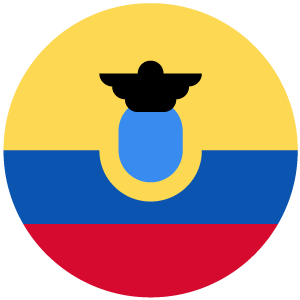
- Ecuador: Czechoslovakia E9-95 between Switzerland and Moscow. Eveliza Plaza Building. First floor. Quito. (+593-2) 5150144.

- Colombia: Carrera 9 No 72-61 Office 303. Bogotá. (+57-1) 2073 850.
